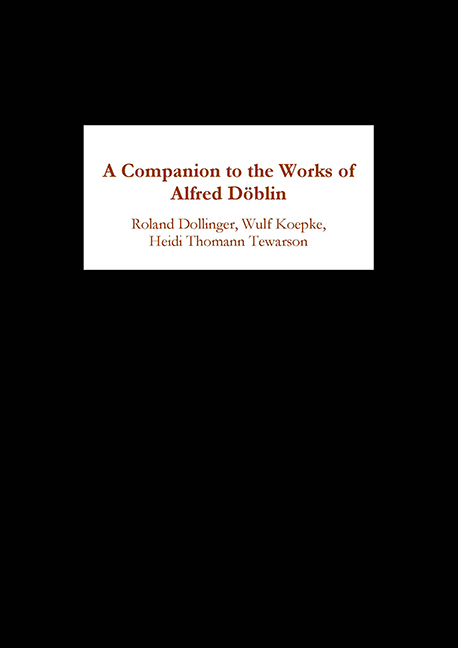Book contents
- Frontmatter
- Contents
- Foreword
- Abbreviations and Translations of Titles
- Works by Alfred Döblin
- Introduction
- Early Works
- Döblin's Early Collection of Stories, Die Ermordung einer Butterblume: Toward a Modernist Aesthetic
- The Advent of Döblinism: Die drei Sprünge des Wang-lun and Wadzeks Kampf mit der Dampfturbine
- Works of the Weimar Period
- Exile and Return to Europe
- Bibliography
- Notes on the Contributors
- Index
The Advent of Döblinism: Die drei Sprünge des Wang-lun and Wadzeks Kampf mit der Dampfturbine
from Early Works
Published online by Cambridge University Press: 27 April 2017
- Frontmatter
- Contents
- Foreword
- Abbreviations and Translations of Titles
- Works by Alfred Döblin
- Introduction
- Early Works
- Döblin's Early Collection of Stories, Die Ermordung einer Butterblume: Toward a Modernist Aesthetic
- The Advent of Döblinism: Die drei Sprünge des Wang-lun and Wadzeks Kampf mit der Dampfturbine
- Works of the Weimar Period
- Exile and Return to Europe
- Bibliography
- Notes on the Contributors
- Index
Summary
Between 1912 and 1915 Alfred Döblin wrote his first two major novels in a sustained burst of extraordinary creative energy. Die drei Sprünge des Wang-lung and Wadzeks Kampf mit der Dampfturbine encapsulate the paradoxes and polarities that characterize his oeuvre as a whole. In the catalogue of his novels, sprawling epics of mass movements in distant times and exotic places (Wang-lun, Wallenstein, Berge Meere und Giganten, Amazonas) alternate with works set in the urban, industrial present (Wadzek, Berlin Alexanderplatz, Pardon wird nicht gegeben, November 1918, Hamlet oder die lange Nacht nimmt ein Ende). In 1914 Döblin made his own Sprung directly from late eighteenth-century China in Wang-lun into early twentieth-century Berlin in Wadzek. Although these two works might at first appear to be poles apart, the following essay will argue that they display similarities of origin, theme, and imagery.
Upon publication in 1916, Wang-lun was hailed as a modern masterpiece, and reviewers compared it to cubist art (Schuster/Bode, 28– 29). Two years later, Wadzek evoked reactions from reviewers that with few exceptions ranged from puzzled to nauseous. “Cubist” was applied to it as well — and with perhaps more justification — but the most frequent adjective in reviews of Wadzek is “grotesque” (Schuster/Bode, 52–58). Even as sympathetic a reader as Martin Buber, who had recommended source material on China for Wang-lun and to whom Döblin then sent the manuscript of Wadzek, was completely perplexed by it (B I, 79).
One thing that certainly connects the two works is Döblin's decided avant-gardism, which in 1912 received a strong impetus from Italian futurism. In March of that year, German translations of two futurist manifestos appeared in Herwarth Walden's influential journal Der Sturm, in whose pages Döblin had already published his early stories. The subtitle he gave the novel he began to draft in July — “chinesischer Roman” — suggests the influence of Mafarka le Futuriste: roman africain (1910) by futurism's leading literary light and polemicist Filippo Tommaso Marinetti (1876–1944). Always avidly avant-garde and anti-bourgeois, Döblin was attracted by Marinetti's provocative aesthetics of contempt for high culture and his rhetoric of violence and misogyny: “Wir [wollen] die aggressive Bewegung, die fiebrige Schlaflosigkeit, den gymnastischen Schritt, den gefahrvollen Sprung, die Ohrfeige und den Faustschlag preisen.
- Type
- Chapter
- Information
- A Companion to the Works of Alfred Döblin , pp. 55 - 74Publisher: Boydell & BrewerPrint publication year: 2003



